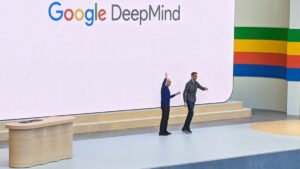Google DeepMind Sets Out to Replicate the Real World with AI 🌐

Google DeepMind has recently unveiled a new initiative involving a dedicated team that will focus on modeling the physical world using artificial intelligence (AI). The primary goal of this team is to develop systems that can simulate complex environments. This initiative holds vast potential for various fields, including video gaming, robotics, and scientific research.
The objective of this new team is to create advanced models that can accurately mirror the physical laws and interactions found in our world. By achieving this, it is believed that transformative advancements can be made in various areas, including robot training, multimedia content generation, and possibly even scientific inquiry. The researchers’ ambition is to expand the limits of artificial intelligence capabilities.
The Foundations of World Modeling
World modeling hinges on AI’s ability to comprehend and anticipate interactions among various objects. By analyzing extensive datasets, algorithms can recreate realistic scenarios. This approach opens doors for practical applications in both virtual settings and real-life situations.
For instance, video games provide an excellent platform to test and refine these technologies. By constructing intricate virtual ecosystems, researchers are able to experiment and improve their models effectively. Additionally, these simulations can serve as a safe space for training robots before they are put to work in real-world conditions.
Promising Applications
One of the most exciting prospects of this initiative is the creation of hyper-realistic AI-generated videos. Such content can find applications in the entertainment sector, as well as in education and professional training programs. Furthermore, these AI models may assist in forecasting complex physical phenomena for research and development purposes.
In the field of robotics, advancements in world modeling can facilitate the design of more autonomous and adaptable robots. By simulating various environments, researchers can better prepare these machines to navigate real-world challenges, thus speeding up the technological innovation cycle.
Challenges to Overcome
Despite the significant progress being made, several challenges persist. The sheer complexity of physical laws and the necessity to process vast quantities of data present substantial technical hurdles. Moreover, it is crucial to maintain ethical standards and transparency while developing these models.
Collaborative efforts among AI specialists, physicists, and engineers will be vital in addressing these challenges. Nevertheless, the outcome of this collaboration has the potential to revolutionize our understanding of the physical world and how we interact with it, signifying a promising future ahead for these technologies.





